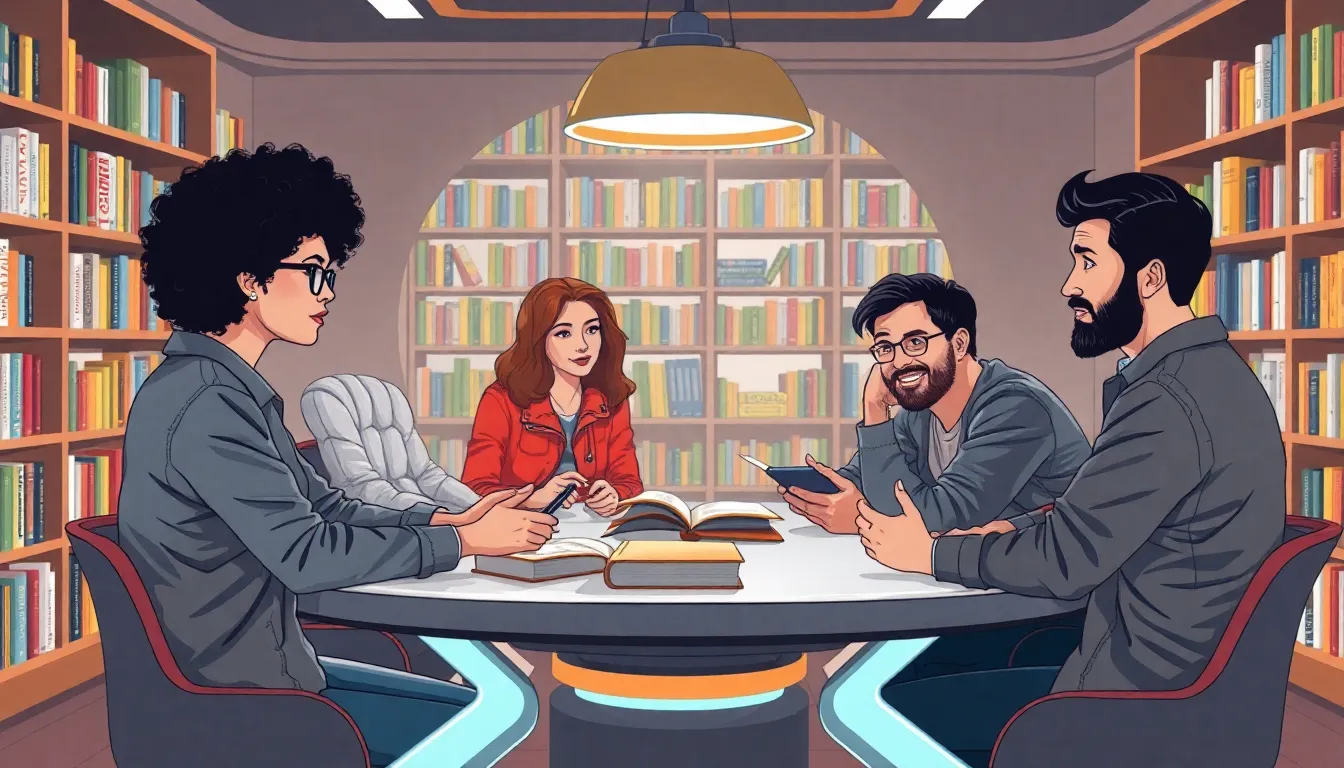
Soft Science Fiction: Discover the Heartfelt Stories Behind Whimsical Worlds
In a universe bursting with exploding spaceships and mind-bending technology, soft science fiction takes a refreshing detour. Forget the hard-hitting physics and complex equations; this genre invites readers to explore the human experience, emotions, and societal implications of futuristic worlds. It’s where the heart meets the stars, and sometimes, where aliens just want to understand our Netflix habits.
Imagine a world where the biggest challenge isn’t the speed of light but navigating relationships in a society that’s just a tad more advanced than ours. Soft science fiction wraps its readers in thought-provoking narratives and whimsical scenarios, making them ponder life’s big questions while chuckling at the absurdity of it all. So buckle up and prepare for a journey that’s less about the science and more about what it means to be human in an ever-evolving universe.
Soft Science Fiction
Soft science fiction emphasizes the exploration of the human experience. It delves into emotions, societal dynamics, and personal relationships set against imaginative backdrops.
Definition and Characteristics
Soft science fiction prioritizes character development and emotional depth. This genre often incorporates speculative elements, focusing on how technology and societal changes influence people. Themes frequently involve morality, identity, and relationships, allowing readers to reflect on contemporary issues. Additionally, soft science fiction tends to incorporate a whimsical tone, using humor and creativity to present complex ideas. Works like Ursula K. Le Guin’s “The Left Hand of Darkness” exemplify these characteristics, linking rich character arcs with thought-provoking societal commentary.
Differences from Hard Science Fiction
Hard science fiction is marked by scientific accuracy and technical detail. In contrast, soft science fiction often sacrifices rigid scientific principles for narrative depth. While hard science fiction constructs stories around tangible technology and physics, soft science fiction emphasizes emotional and psychological elements. Recognizing this distinction aids in appreciating the unique strengths of each genre. Notable examples include Isaac Asimov’s hard science fiction contrasted with Ray Bradbury’s soft science fiction, highlighting the varied approaches in exploring futuristic concepts.
Notable Works in Soft Science Fiction

Soft science fiction features a variety of notable works that explore human emotions and societal implications. Classic literature often serves as a foundation for this genre.
Classic Literature
Ursula K. Le Guin’s “The Left Hand of Darkness” exemplifies classic soft science fiction. This novel explores gender and identity through the lens of an alien society. In “The Dispossessed,” she further examines anarchism and social structure. Ray Bradbury’s “The Martian Chronicles” presents a poetic view of colonization and its impact on humanity. His work emphasizes themes of nostalgia and loss amidst technological change. Another significant contribution is Isaac Asimov’s “The Gods Themselves,” which reflects on human behavior in the context of alien interaction. These classic works pave the way for deep emotional and philosophical explorations within the genre.
Modern Examples
Contemporary soft science fiction continues to thrive with engaging narratives. N.K. Jemisin’s “The Fifth Season” presents a world grappling with societal collapse and environmental factors. Themes of oppression and power dynamics shape the story’s landscape. Liu Cixin’s “The Wandering Earth” incorporates humanity’s struggle against cosmic forces, emphasizing collaboration and sacrifice. Becky Chambers’ “A Psalm for the Wild-Built” focuses on human connection and purpose, integrating elements of hope and self-discovery. Each of these modern examples showcases how soft science fiction evolves while retaining its core focus on human experience and societal implications.
Themes Explored in Soft Science Fiction
Soft science fiction frequently delves into profound themes centered on human experience, emotions, and societal dynamics. It presents readers with opportunities to reflect on contemporary issues through imaginative storytelling.
Human Psychology and Emotion
Human psychology often takes center stage in soft science fiction. Characters navigate complex emotional landscapes, reflecting personal struggles and societal pressures. Authors like Ursula K. Le Guin create richly developed personas that reveal the intricacies of identity and interpersonal connections. Le Guin’s exploration of gender in “The Left Hand of Darkness” showcases how societal constructs influence individual behaviors. Additionally, modern writers frequently tackle themes of mental health. For example, N.K. Jemisin’s “The Fifth Season” examines trauma and resilience in the face of societal collapse. Readers find themselves drawn into the emotional journeys of characters, evoking empathy and self-reflection.
Social and Cultural Issues
Social and cultural issues serve as essential themes in soft science fiction. Works frequently critique societal norms and explore potential futures shaped by current challenges. Through speculative narratives, authors like Ray Bradbury address colonization and its consequences in “The Martian Chronicles.” Cultural identity also plays a significant role, as seen in Liu Cixin’s “The Wandering Earth,” which emphasizes collaboration amidst adversity. Here, the collective human experience highlights the importance of unity in overcoming monumental threats. These narratives prompt readers to consider their roles within society while addressing themes of oppression, inequality, and cultural evolution.
The Impact of Soft Science Fiction
Soft science fiction shapes the way society views complex issues through narratives that focus on human experiences. Its influence on both literature and media extends beyond traditional boundaries, encouraging creativity and dialogue.
Influence on Popular Culture
Soft science fiction permeates various aspects of popular culture, evident in films, television shows, and literature. This genre often inspires adaptations that explore themes of identity and morality, resonating with audiences. Movies like “Her” and series such as “Black Mirror” depict emotional connections in technologically advanced settings, illustrating society’s evolving relationship with technology. Characters in these stories often reflect contemporary social dynamics, prompting viewers to engage with thought-provoking questions. These narratives encourage exploration of human feelings and ethical dilemmas, making soft science fiction a powerful medium for social commentary.
Contributions to the Genre
Soft science fiction contributes unique perspectives that enhance literary and cultural landscapes. Writers prioritize character development and emotional depth, allowing readers to connect with diverse experiences. This focus attracts authors who challenge societal norms and envision alternative futures. Many notable works emerge from this genre, inspiring subsequent writers to push boundaries further. Themes of resilience, belonging, and social justice often emerge, fostering rich discussions about humanity’s trajectory. As more creators embrace these elements, soft science fiction continues to evolve, stimulating thought and influencing future storytelling.
Conclusion
Soft science fiction stands as a compelling genre that prioritizes the exploration of human emotions and societal dynamics. By weaving whimsical narratives with profound themes, it invites readers to engage with complex issues in relatable ways. The genre’s ability to reflect contemporary challenges through character-driven stories fosters a deeper understanding of identity, morality, and human connection.
As soft science fiction continues to evolve, it remains a vital part of the literary landscape. Its unique approach not only entertains but also encourages critical thinking about the future and humanity’s place within it. With each new work, the genre reaffirms its significance in shaping cultural dialogues and inspiring readers to reflect on their own experiences and societal roles.
